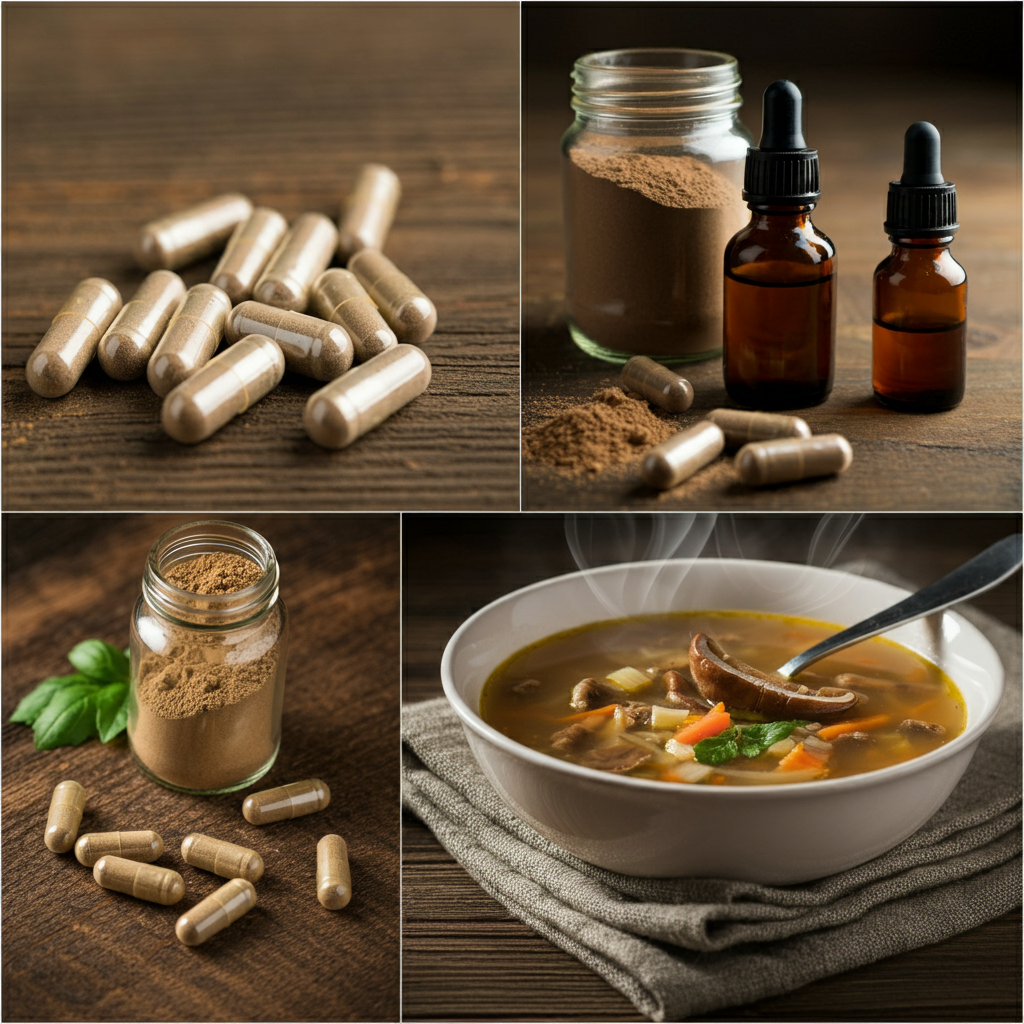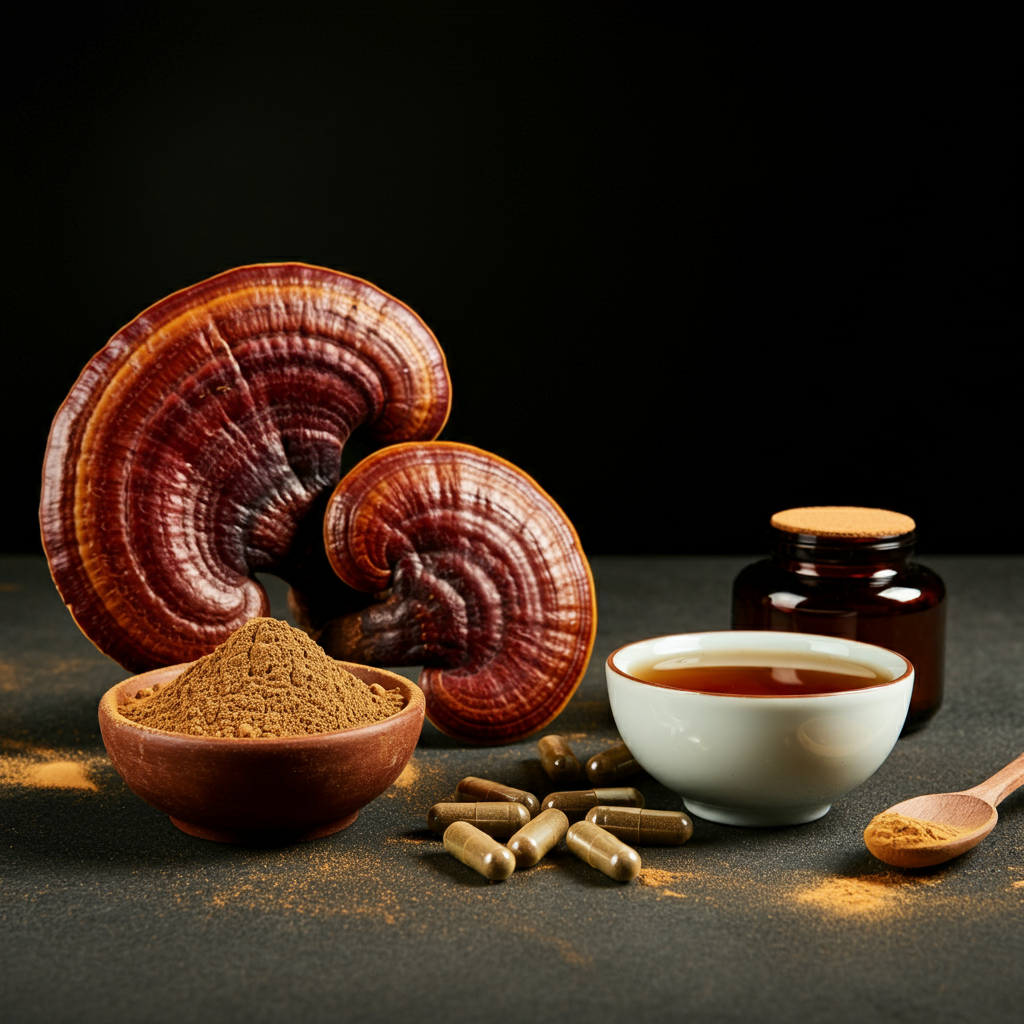Artisanal Mushroom Products
and Directory
This guide aims to provide practitioners and consumers with a framework for evaluating the quality and efficacy of artisanal mushroom supplements. It also hopes to inform artisanal producers on the best practices they should employ with their products.
At the bottom of the guide we provide a small directory of businesses which produce medicinal mushroom products. We have not looked into each of these businesses nor do we endorse them. Please do your own research their products before purchasing.
Note: Any products mentioned are not intended to diagnose, treat, cure, or prevent any disease. Any information given is not intended to replace medical advice offered by licensed medical physicians. Please consult your doctor or health practitioner for any medical advice.
What is an artisanal mushroom supplement?
Artisanal mushroom supplements are those produced in small batches via non-industrialized processes. This not only includes products made at home by foragers and growers but also by established companies who have specialized equipment and dedicated spaces for production. These products are not typically found in big-brand stores but in farmers’ markets, online, events, and localized outlets.
While small producers make some excellent products, it’s essential to know that quality can vary significantly. We don’t believe any small producer purposefully tries to deceive their customers, but producing a good supplement can be complex with many nuances.
For this reason, we thoroughly encourage any one producing mushroom supplements to dive deep and do their research. Read books, take courses, and study the existing literature you can find. After all, many individuals seek medicinal mushrooms for treating serious and sometimes life threatening diseases. In this context, producing ineffective products, even out of ignorance, is irresponsible and a disservice to those seeking genuine solutions to their health problems.
Like wise, if you are seeking supplements for a serious illness make sure you really understand the nuances of identifying a quality products. In some cases, it may be best to go with larger producers who conduct analytical testing on their products, as we recommend in our supplement buying guide. As mentioned in our website, medicinal mushrooms should be incorporated into a health practice that involves diet, exercise, and other forms of therapies as recommended by a health care practitioner.
Since most artisanal producers do not have the capital to conduct third-party testing on their products, the best way to determine potency is by understanding the best practices. If they follow good practices, then the product should be adequate.
Primary Material Sourcing
One of the big things that separates artisanal producers from big-name supplement companies is that they can source their mushrooms from local growers. In some cases, they may cultivate them themselves. By purchasing a product that is locally sourced, you are promoting the local mushroom cultivation industry and ensuring they use fresh and high-quality primary materials.
While it’s not a complete loss if a producer sources mushrooms from international distributors, it does take away one of the main attractive features of purchasing from an artisanal producer. In these cases, artisanal producers should, at the very least, utilize high-quality organic-certified materials.
Source Whole Fruiting Bodies not Powders
When sourcing primary materials for making products, always get whole fruiting bodies. It can be challenging to tell the quality of the material when it is purchased in powder form. It could contain scraps, moldy mushrooms, and impurities. It also may become oxidized and lose potency.
Get Fresh Material
The fresher the material, the better. If it’s transformed directly after harvest, you ensure little degradation or loss of the bioactive compounds in the mushroom. Old mushrooms that have been improperly stored may lose potency. Many mushrooms also lose potency when dried, especially at high temperatures.
Production Methods
Even if a producer uses the highest quality primary material, the potency of their product will be highly influenced by their production methods. The art of extraction and production is complex, with many nuances that are poorly understood or agreed upon by the general community. We give some suggestions below, but this topic is infinite and we recommend those interested to do more research.

Tinctures
Liquid extracts in the form of tinctures should clearly state their extraction ratio. Essentially, how many grams of mushrooms go into every gram of your product? For example, if 1kg of solvent (water or ethanol) is used for every 1kg of dried mushroom, you have a 1:1 extract ratio. If 2kg of solvent is used for every 1kg of dried mushroom, you end up with a 1:2 extract ratio, which is half the potency. Realistically, no supplement should have less than a 1:1 ratio.
For many mushrooms, one of the most effective ways to make a liquid extract is with a soxhlet extractor. This extractor recycles the solvent allowing for a repeated extraction of the material, ensuring that very little soluble compounds are left in the mushroom material.
The standard practice for liquid extracts is conducting a double extraction. This means an extraction with alcohol and water, to ensure both alcohol-soluble and water-soluble compounds are extracted from the material. Alcohol is also crucial to ensure the tincture is shelf stable.
Powders
For many, powders are considered the most effective way to consume/produce mushroom supplements. Since they utilize the entirety of the mushroom, and nothing is filtered out or added, they ensure a good concentration of bioactive compounds. This is compared to tinctures, which sometimes fail to extract all the beneficial compounds from the mushroom material not incorporated into a product.
For a powder to be effective, you should not utilize raw mushroom powder. Instead, the mushroom material should undergo a preliminary extraction (either heating alone or with solvent) before drying and powdering. This is particularly true for woody polypores.
Other Considerations
Every mushroom is unique, with distinct compounds and properties that require species-specific treatments. Some compounds are heat sensitive, while some mushrooms require heat-treatment to make the extraction effective. There are endless amounts of details, and this article is merely scratching the surface. As time goes on, we hope to develop species-specific guidelines for extractions to share with our readers.
As a consumer, the best thing you can do is simply talk to the producer and inquire about their practices. It’s important to judge yourself if they seem knowledgeable, experienced, and motivated about their product. Use this guide and others to make informed decisions. Check out our resources page to find other educational materials.
Lastly, while this page on our website is specifically tailored towards promoting artisanal and local products, we want to emphasize that there are cases when it may be recommended to go with a larger supplement company. This is especially true for those looking to treat more serious conditions. Larger companies products verified for bioactive compounds, aswell as competitive prices that may allow you afford the dosages needed for effective treatment.
Directory Of Artisans
We do not endorse any of the companies included in this directory. We have not checked their products or processes, so please investigate each one before purchasing. Feel free to let us know if you’d like to be included in this list, or if you think we have included a company you think conducts malpractice. Contact us a mushroomclinicaltrials@gmail.com
USA and Canada
Ash Farms
Earth & Spirit Botanicals
BluBailes Farms
Cascadia Mushrooms
Duckabush Mushrooms
Far West Fungi
Feral Fungi
Fungaia Farm
Fungi Family Farm
Hamilton Mushrooms
Half Hill Farm
Hi-Fi Mycology
Hodgins Harvest
Isle of Wight Mushrooms
Mushroom Mountain
Myco Terra Farm
Mycosymbiotics
North Spore
Octagon Farm
Performance Fungi
Sugarshack Mushrooms
TruNorth Naturals
M2 Ingredients
India
Nuvedo
South America
MicélioBR
Cogcogumelos
Bazar Fung
Cordycol
Australia
MYCRO
Natura Mushrooms
Touchwood Mushrooms
Bright Valley Mushrooms
Wild Remedies via Little Acre
Northern Rivers Mushrooms
That Mushroom Guy
Europe
KÄÄPÄ Biotech
Bristol Fungarium
Moreish Mushrooms
Life Cykel
Shroomwell
MUSHEEZ
Mexico and Central America
Nu’u México
Madre Sierra
Tejiendo Remedios
Fungi Monterrey
Funset MX
Biofunga
Micológica
Garden Kuuts
South Africa
Aetherapothecary
